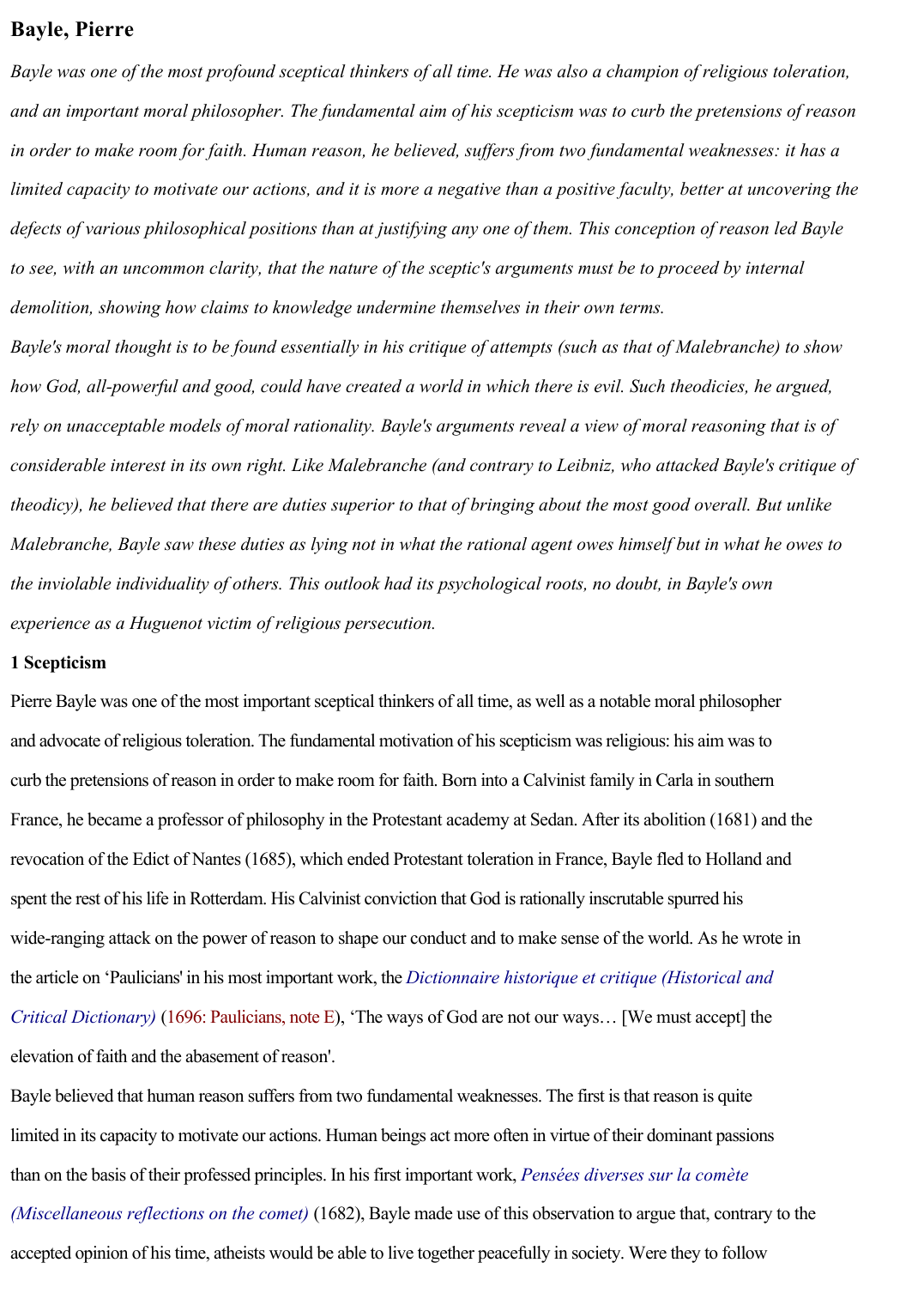Bayle, Pierre
Publié le 16/05/2020

Extrait du document
«
Bayle, Pierre
Bayle was one of the most profound sceptical thinkers of all time.
He was also a champion of religious toleration,
and an important moral philosopher.
The fundamental aim of his scepticism was to curb the pretensions of reason
in order to make room for faith.
Human reason, he believed, suffers from two fundamental weaknesses: it has a
limited capacity to motivate our actions, and it is more a negative than a positive faculty, better at uncovering the
defects of various philosophical positions than at justifying any one of them.
This conception of reason led Bayle
to see, with an uncommon clarity, that the nature of the sceptic's arguments must be to proceed by internal
demolition, showing how claims to knowledge undermine themselves in their own terms.
Bayle's moral thought is to be found essentially in his critique of attempts (such as that of Malebranche) to show
how God, all-powerful and good, could have created a world in which there is evil.
Such theodicies, he argued,
rely on unacceptable models of moral rationality.
Bayle's arguments reveal a view of moral reasoning that is of
considerable interest in its own right.
Like Malebranche (and contrary to Leibniz, who attacked Bayle's critique of
theodicy), he believed that there are duties superior to that of bringing about the most good overall.
But unlike
Malebranche, Bayle saw these duties as lying not in what the rational agent owes himself but in what he owes to
the inviolable individuality of others.
This outlook had its psychological roots, no doubt, in Bayle's own
experience as a Huguenot victim of religious persecution.
1 Scepticism
Pierre Bayle was one of the most important sceptical thinkers of all time, as well as a notable moral philosopher
and advocate of religious toleration.
The fundamental motivation of his scepticism was religious: his aim was to
curb the pretensions of reason in order to make room for faith.
Born into a Calvinist family in Carla in southern
France, he became a professor of philosophy in the Protestant academy at Sedan.
After its abolition (1681) and the
revocation of the Edict of Nantes (1685), which ended Protestant toleration in France, Bayle fled to Holland and
spent the rest of his life in Rotterdam.
His Calvinist conviction that God is rationally inscrutable spurred his
wide-ranging attack on the power of reason to shape our conduct and to make sense of the world.
As he wrote in
the article on ‘Paulicians' in his most important work, the Dictionnaire historique et critique (Historical and
Critical Dictionary) (1696: Paulicians, note E ), ‘The ways of God are not our ways… [We must accept] the
elevation of faith and the abasement of reason' .
Bayle believed that human reason suffers from two fundamental weaknesses.
The first is that reason is quite
limited in its capacity to motivate our actions.
Human beings act more often in virtue of their dominant passions
than on the basis of their professed principles.
In his first important work, Pensées diverses sur la comète
(Miscellaneous reflections on the comet) (1682), Bayle made use of this observation to argue that, contrary to the
accepted opinion of his time, atheists would be able to live together peacefully in society.
Were they to follow.
»
↓↓↓ APERÇU DU DOCUMENT ↓↓↓
Liens utiles
- Pierre Bayle
- Pierre Bayle
- Bayle, Pierre Brossette, Claude Perrault, Charles
- Pierre Bayle
- Bayle, Pierre - littérature.


